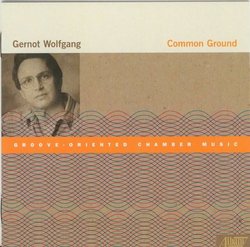| All Artists: Gernot Wolfgang, Delores Stevens, Robert Thies Title: Gernot Wolfgang: Common Ground Members Wishing: 0 Total Copies: 0 Label: Albany Records Release Date: 8/22/2006 Genre: Classical Styles: Chamber Music, Historical Periods, Classical (c.1770-1830) Number of Discs: 1 SwapaCD Credits: 1 UPC: 034061085423 |
Search - Gernot Wolfgang, Delores Stevens, Robert Thies :: Gernot Wolfgang: Common Ground
 | Gernot Wolfgang, Delores Stevens, Robert Thies Gernot Wolfgang: Common Ground Genre: Classical
|
Larger Image |
CD Details |
CD Reviews"The Most Extraordinary Encounters and Events" J Scott Morrison | Middlebury VT, USA | 08/30/2006 (5 out of 5 stars) "George Balanchine used the phrase 'the most extraordinary encounters and events' to describe his dances, and that phrase came to mind again and again as I listened (again and again) to this CD of chamber music by a composer previously unknown to me, the Austro-American Gernot Wolfgang (b.1957 in Bad Gastein). Wolfgang is himself a jazz guitarist -- but there is no guitar among the instruments featured here -- whose background is clearly discernible in his music, largely because so much of the music is, in his words, 'groove-based.' Using ostinato jazz-tinged rhythms (which, however, he varies and extends to create interest and surprise) Wolfgang creates polytonal, polyphonic music of the highest degree of unpredictability even though with close listening one can pick out melodic and harmonic patterns that are not immediately obvious or ever merely mundane. He frequently uses synthetic scales, as well as the usual major/minor and chromatic/diatonic scales; harmonies and melodies are thus often not immediately predictable or conventionally beautiful. Throughout one has the sense that the music is dancing. It has a logic and beauty all its own with closer listening and I found myself utterly beguiled.
'Metamorphosis' for violin, viola and piano is based on an initial violin figure which is then taken through continuous variations in a fresh harmonic and rhythmic style that partakes of such things as polytonalism, Hindemithian counterpoint, bop, and free improvisation. 'Common Ground' for bassoon and cello (probably my favorite of all the works here) is in three movements. 'Blues Upside Down' presents an upbeat blues figure which is then, midway, turned upside down and given a different character. 'Trading Places' is essentially a two-part invention where the bassoon and cello, midway, trade their lines; it is not quite as simple as that but that's the general idea. 'Igor, at Last' is so named because after a funky main section the piece ends with a Stravinskyan passage reminiscent of his Concerto in D for Strings. 'Jazz & Cocktails' for piano trio attempts to reproduce in music the assymetric chatter one hears at a cocktail party. There are passages of utter banality alternating with the confusing competition of other nearby more interesting conversations. There are reminiscences of Ravel cheek-by-jowl with bop. 'Dual Identity' is for solo bassoon -- played brilliantly by the composer's wife, Judith Farmer -- in that most difficult of forms, an unaccompanied solo work for melody instrument. It is by turns or simultaneously contrapuntal, atmospheric, humorous, lyrical, poignant. There is humorous use of multiphonics. 'Thin Air' for string trio recalls a trip to the Sierras that Wolfgang and his wife took. The three sections are 'Mountain Goat' (suitably athletic and with some hints of bluegrass), 'Twilight' (atmospheric, calm), and 'Paws' (the latter written after the composer had taken a fall on the trip and had to recuperate in bed for a few days after they got back home, giving him time to watch the couple's two cats). 'Night Shift' for solo piano is a jazz-tinged lullaby (one can hear Bill Evans in the background) that merges every so gently into a series of dreamscapes. A very effective piece. The musicians involved in this project are mostly Southern Californian, some of whom work in the movie industry or in local orchestras or universities. They are universally superb and deserve to be named here. They are Margaret Batjer and Tereza Stanislav, violin; Brian Dembow, viola; Stephen Erdody, Armen Ksajikian and Cécilia Tsan, cello; Judith Farmer, bassoon; Delores Stevens and Robert Edward Thiel, piano. Recorded sound is absolutely first-rate. This one gets an enthusiastic recommendation. Scott Morrison" |

 Track Listings (10) - Disc #1
Track Listings (10) - Disc #1